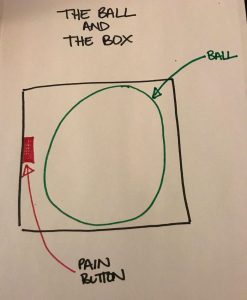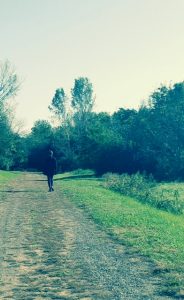Grief feels rather slippery when we try to grab and fix it. Elusive, changeable as a chameleon, and coming and going in its own rhythms, it's like the tides of an ocean.
Thomas Golden in his book, Swallowed by A Snake, delivers a beautiful story that "going into grief may at times be like being eaten by a snake":
"...The man carefully chose his spot in the jungle and sat and played his flute. He was aware that the boa was approaching, but continued his playing. Then without warning the snake attacked and swallowed the flute player with one bite. The darkness from within the snake's belly was complete. The flute player tried to make himself as comfortable as possible, then unpacked his belongings and took out his knife. He consciously and deliberately used the knife to cut away the snake's belly a bit at a time. The snake reacted to this tremendous pain in its belly by making as much room for the flute player as it could.
The flute player knew that it was going to take awhile to complete the task of killing this huge snake. He proceeded to cut and eat a bit of the snake's flesh each time he got hungry....
After awhile the flute player came to the boa's heart. Upon cutting this, the boa died. At that point the flute player emerged from the snake and returned to the village playing his flute."
With gentle emotional persistence and time, healing happens. In reading this story, we might make a mistake in thinking we can vanquish grief, but this is not my experience. We grow into it and around it. It informs and resurrects our highest selves. And we'd do best not to turn away from it due to our fear of the unknown.
Grief can come from declines in physical health, job loss, relationship ruptures, and natural aging too. What we've experienced within the context of first COVID-19, and then with the multitude of racial injustices over centuries and now that is now igniting a major social movement, includes the experience of grief too. For example, with the virus, some have lost their sense of security and safety in the world, some have lost loved ones to the disease, and some have lost connections that can only be felt deeply in person.
And so, what do we do with all this? I've found that digging deeper still for the equanimity that I believe is inherent in all of us, I choose to take hold of my personal sphere of control, focusing on my mental and physical health, and supporting the people I engage with in Peer Support to do the same as they see fit. This is all on the micro level of my individual life, though I'm finally learning how to engage in activism and self-education, as well. (The New Jim Crow is truly eye-opening) I'll leave written words regarding activism to someone with more experience.
My grandma taught me that life doesn't give you what you ask of it, necessarily. She went through sharp and heavy moments in her life. She knew that some things are best accepted (not liked necessarily), and then molded further from an attitude of even-handedness.
Ultimately, I cannot control death, but I can control my attitude towards my own eventual death. (I realize this is dark for some, but it's true I swear...) I also cannot control whether people agree with my values, but I can honor the humanity in them, all the same. I cannot control how other people engage social responsibility around mask-wearing and social distancing, but I can control how I react. I cannot control someone's blind racism, but I can utter rebuttals and push back against the larger system.
None of this is easy, but I find that when I point my toes in a particular direction, my feet get to the right destination, inevitably.
For a wonderful reading on grief as it pertains to men, as well as comparisons of our culture's treatment of grief with other world cultures, Swallowed by A Snake is quite illuminating.
-Theresa Bird is a Peer Support Specialist at Lawrence Public Library.




Add a comment to: The Flute Player and How He Grieved